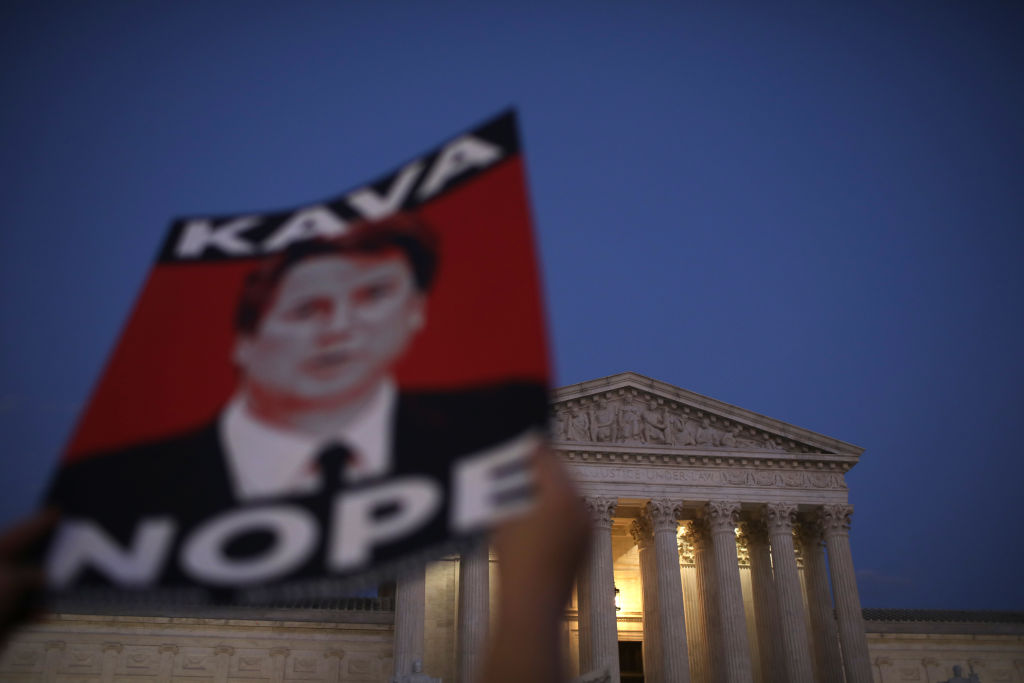After several excruciating weeks, the sordid spectacle surrounding Brett Kavanaugh’s nomination to the Supreme Court is finally coming to an end. A Senate vote is expected imminently. Republicans seem confident that Judge Kavanaugh will be promoted to the highest court in the land, but nothing is over until it’s over. Regardless of the outcome, the Kavanaugh affair isn’t going anywhere.
It will dog American politics for years, even decades to come. The partisan nastiness surrounding the Kavanaugh nomination is a hinge point in our political life – no matter what one thinks about the judge and his case. Ever since word leaked on September 12 of Senate Democrats withholding a 30-something-year-old claim of sexual assault against the Republican judge, American headlines have known no other story. What followed has been a public spectacle of late-Roman proportions.
As for the allegations themselves, their veracity seems secondary to many. In its last-minute re-look at the judge, by Democratic demand, the FBI found nothing to substantiate allegations of sexual misconduct against Kavanaugh. Neither had the FBI found anything significantly derogatory in the previous half-dozen background investigations it performed on Kavanaugh since the early 1990s, when he came to Washington, DC, fresh from law school, to make his career.
Brett Kavanaugh had the misfortune of walking straight into the buzzsaw located at the intersection of partisan politics, social media, and left-wing anger over the #MeToo movement, which since it went viral last year has ended the careers of dozens of prominent men, of varying sexual orientations. They have been publicly accused of sexual misconduct of many kinds, and Judge Kavanaugh found himself in the crosshairs of progressives looking for their next scalp.
And what a scalp Kavanaugh was! A white male conservative of prep-school privilege nominated by Donald Trump, the Left’s preeminent hate figure in modern times. Not to mention that Kavanaugh could be the deciding vote on the Supreme Court that may overturn numerous liberal victories. Since the 1950s, Democrats have used the federal courts, the most senior one especially, to win what they could not achieve via the ballot box, all the while seemingly without pondering that Republicans might try the same tactic someday. That day looks to be here.
While rational calculation would have revealed that Senate Democrats stood little chance of stopping Kavanaugh, who possessed an impressive judicial record and was no right-wing extremist, once word leaked of his alleged sex crimes, there was no getting away from the firestorm. Indeed, Democrats and their media allies did little to tamp down the conflagration. On the contrary, for some on the Left, Kavanaugh seemed a perfect opportunity to educate the rest of us in our unenlightenment. That the resulting interrogations of the nominee by Democrats on the Senate Judiciary Committee – complete with deep-dives into high school yearbook jargon from the Fast Times at Ridgemont High era – resembled au courant campus sexual kangaroo courts has been noted, by no means only on the Right.
The predictable outcome was a country more bitterly divided than ever. No matter what the FBI found, half the country would have rejected it as ‘fake news’ to use President Trump’s favourite term. Whether or not Brett Kavanaugh joins America’s top court, he will be viewed in perpetuity as either a mendacious frat-boy sex criminal who never belonged on the Supreme Court – or as a martyr to political correctness and the left-wing mob, depending on one’s party affiliation.
With the midterm elections only a month away, upon which Donald Trump’s fate may hinge, Democrats perhaps made a grave miscalculation. While they seem ebullient, having found a cause to motivate educated, suburban (mostly white) women to go out and vote for Team Blue on November 6, it’s worth asking how many of those voters, who have been abandoning the GOP in droves in recent years, were not already ardently in the Democratic camp.
Indeed, the Senatorial inquisition of Judge Kavanaugh seems to have motivated the Right too, which until last month was despondent and deeply divided over Trump and his trash-talking Twitter feed, into a unity counteroffensive on Kavanaugh’s behalf. A month is an eternity in politics, but there appears little doubt right now that the anticipated Blue Wave in the midterms may not happen quite as Democrats hope. That several prominent #NeverTrump conservatives this week publicly pronounced the president, whom they despise, as a lesser evil than the rampaging Democrats seems significant.
A deeply divided democracy, with irreconcilable narratives in perpetual conflict, is no healthy thing. The Kavanaugh spectacle reminds of France’s awful Dreyfus Affair of the 1890s. Then, an army officer, Captain Alfred Dreyfus, got a life sentence for passing military secrets to the hated Germans. It was all a put-up job, insisted the Left, which viewed Dreyfus’s antagonists – right-wing Catholics and monarchist army officers of dubious loyalty to the secular Republic – as cynics who framed an innocent man. That Dreyfus was a Jew made the case more suspect still. The affair dominated French public life for more than a decade, paralysing politics, since there could be no middle ground.
The Left had a point, and more than a century later there’s no serious doubt that Dreyfus indeed was framed (the real traitor was a right-wing Catholic officer). In 1906, after several years in prison, Dreyfus was a free man; his defenders never stopped fighting for him, but at the cost of poisoning French politics for a generation. ‘J’accuse!’ was the famous rallying cry of the Dreyfusards in 1898, led by the muckraking journalist Émile Zola, and his slogan became the cri de coeur of France’s left-wing, which saw in the anti-Dreyfusards everything they hated about the Right.
As recalled by Charles Péguy, one of the more ardent literary Dreyfusards, whose faith in the accused never wavered: ‘Not only were we heroes, but in reality the Dreyfus Affair can only be explained by a need for heroism that periodically seizes this people, this race, by a need for heroism that seizes an entire generation. These great movements, these great ordeals of an entire people are like those other great ordeals: wars.’ It says something that Péguy was intermittently irritated at Dreyfus for being insufficiently Dreyfusard.
The bitter, very public Dreyfus Affair created Two Frances: one secular, progressive, and confident in its own rectitude; another conservative, religious, and fearful for the future. They hated each other and shared nothing save a flag; they had different saints, different sinners, different histories, different desires. This profound division lasted decades, eroding basic national unity. Some historians would detect its footprints in France’s insufficient ardor at resisting Hitler’s invasion in 1940.
There are lessons for Americans today. When narratives take precedence over facts, truth suffers. Passions are difficult to control when unleashed, particularly when politics becomes an ersatz religion. There has been democratization over the last century. While Dreyfus’s enemies considered him suspect, and probably guilty, because he was a Jew, Kavanaugh’s enemies have broadened that suspicion to now encompass all white males. Whatever the truth of the Kavanaugh affair – as with Dreyfus, it may take years for full stories to emerge – its deleterious impact on American politics is with us to stay.

























